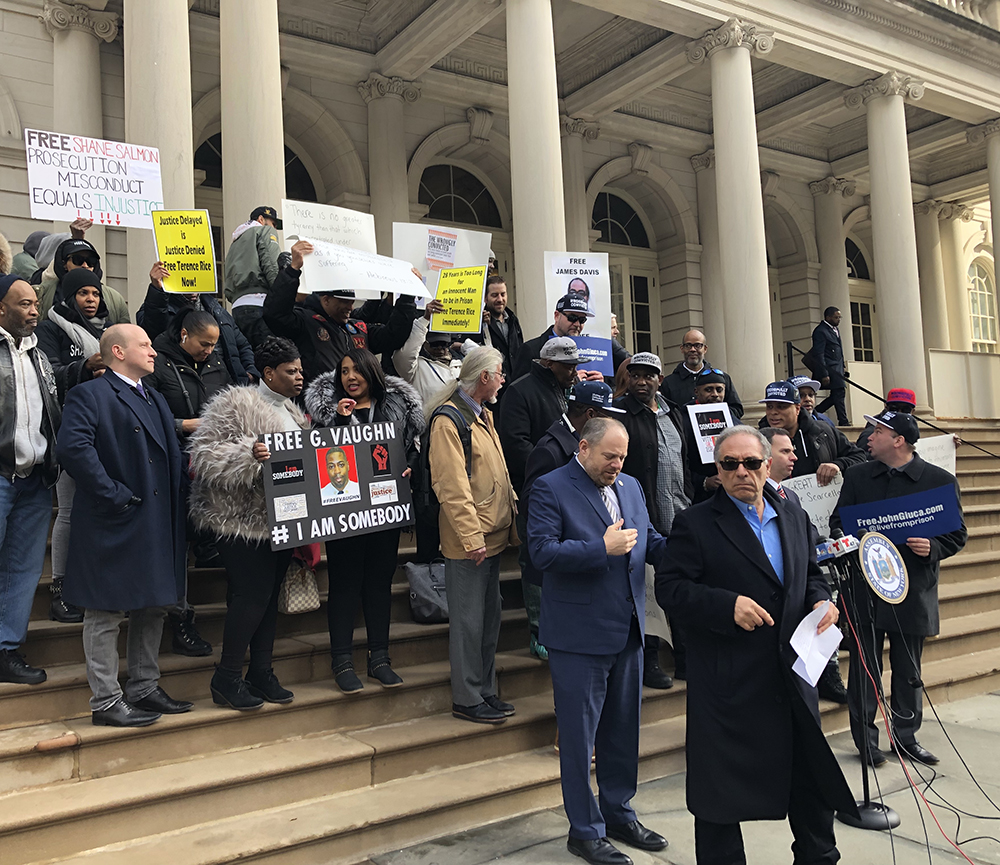NEW YORK — Jabbar Washington wasn’t nervous. The crack cocaine found in the hallway of the Tilden Housing project wasn’t his and he was sure the police would believe him when he said as much. He was a good kid, with great parents, who had had a good childhood in the projects.
However, as police rounded up all the men who lived in that hall, Washington ended up with a drug possession charge. This wouldn’t be the first time his innocence would be challenged.
 A few years later, at age 22, he was brought in for a line-up concerning a robbery and murder that had happened 13 months earlier, in January 1995. The only witness placed Washington at the scene even though he was with his girlfriend at the time.
A few years later, at age 22, he was brought in for a line-up concerning a robbery and murder that had happened 13 months earlier, in January 1995. The only witness placed Washington at the scene even though he was with his girlfriend at the time.
Before the Brooklyn jury delivered the guilty verdict in 1997, Washington still thought he wouldn't go to prison.
“That was the furthest thing from my mind, I didn’t think that was going to happen,” Washington said. “Not in a million years.”
Without the Kings County Conviction Review Unit, Washington would have served 25 years in prison for a crime he didn’t commit. Instead, he was freed after 21 years in Sing Sing Correctional Facility.
To make it easier for wrongful convictions to be overturned, state Assembly Member Dan Quart, a Democrat from New York City, proposed a bill in February. His statewide conviction review commission would create a formal petition process for incarcerated people and examine evidence based on the latest science.
Because the conviction review units are now run by the prosecutors within the district attorney’s offices who originally prosecuted the case, there’s a built-in bias, Quart said in a statement. Cases can also take years to review. Plus, there are no set standards for assistant district attorneys to follow and the success of the conviction review unit can depend on the office’s time and resources, the statement continued.
New York has the third largest rate of conviction overturns in the country.
Most counties don’t have unit
While the bill could not be introduced during the 2019 legislative session, it is now in a working group to ready it to be introduced in the next session, said Aleksandra Wolan, a Quart staffer.
Within New York, only four DA offices have conviction review units (CRUs): Bronx, Kings (Brooklyn), Manhattan and Staten Island. Queens is one of the 58 counties in the state, and the only county in the city, that doesn’t have a conviction review unit.
Staten Island’s unit was the most recently established by the New York City Council, for $450,000. This funded the additional staff to review cases.
“The council was very happy to fund Staten Island’s conviction review unit and would’ve been happy to fund Queens as well if Queens was willing to have one,” said Rory Lanceman, a Democratic City Council member.
Tiffany Cabán, projected winner of the Queens' DA primary, has said she would open a CRU in the district.
Lanceman said he recognizes the shortcomings some of the units have, he said. A statewide independent review unit would make sure bad practices could be avoided.
“When it comes to speaking about someone spending decades in prison for a crime they didn’t commit, having another state-funded entity available to them to demonstrate their wrongful conviction is just another valuable tool to ensure we have a fair justice system,” he said.
Ron Kuby, a civil rights and defense attorney, chose to handle Washington’s case after his previous lawyer left. There are two types of review units, Kuby said, the ones that adhere to the best practices of transparency, collaboration, independent counsel and standards — and the ones that do not.
“Manhattan is the worst of all the CRUs,” he said. “It’s almost as if they took every article that was written about best practices for CRUs and used it as a checklist of things they were not going to do.”
The Manhattan unit has been in operation since 2010. In nine years, nine convictions have been overturned out of 200 claims. Kings County, on the other hand, has overturned 25 cases since 2014, with 100 cases currently pending review.
Most cases can take anywhere from 18 months to five years to be completed, Kuby said. Since Washington’s release in December 2018, the Brooklyn unit has freed three wrongfully convicted men through May.
Washington feared he would be in prison for the rest of his life because of how long the review process took. For three years, he was told nothing about his case until Kuby took over.
“They changed my life but they stressed me out,” Washington said.
The units are needed because every borough has the problem of the wrong people being in prison, he said. But there needs to be careful structuring of the unit to ensure prosecutors who were on the original case are not on the new investigation.
“If that’s not injustice, what is injustice?” Washington asked, agitation in his voice growing as he listed the people he knows who are wrongfully imprisoned, waiting for their turn in the review unit. “We can’t turn our backs on the people that are still going through the same things we went through.”
